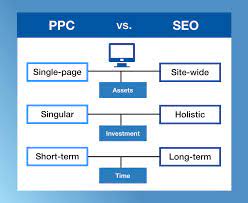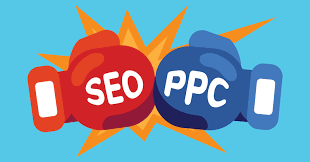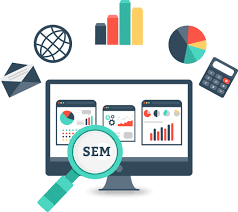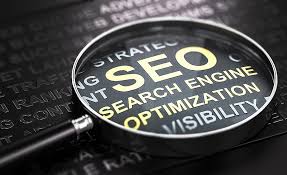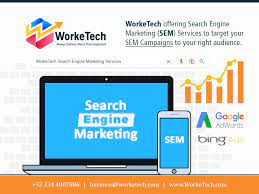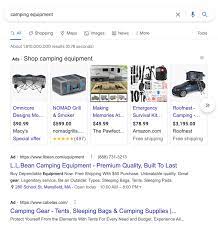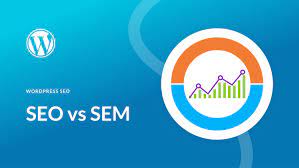Unlocking the Power of SEM and SEO: A Comprehensive Guide to Digital Marketing Strategies
SEM and SEO: Understanding the Difference
Search Engine Marketing (SEM) and Search Engine Optimization (SEO) are two vital components of any digital marketing strategy aimed at improving a website’s visibility in search engine results. While both SEM and SEO focus on increasing website traffic through search engines, they differ in their approaches and techniques.
Search Engine Optimization (SEO)
SEO is the process of optimizing a website to improve its organic (unpaid) search engine rankings. This involves various strategies such as keyword research, content optimization, link building, and technical enhancements to make the website more search engine-friendly. The goal of SEO is to increase organic traffic by appearing higher in search engine results pages (SERPs).
Search Engine Marketing (SEM)
SEM, on the other hand, includes paid advertising efforts to gain visibility in search engines. This typically involves pay-per-click (PPC) campaigns where advertisers bid on keywords relevant to their target audience. SEM allows businesses to place ads at the top of search results for specific keywords, driving immediate traffic to their websites.
The Relationship Between SEM and SEO
While SEM and SEO serve distinct purposes, they can complement each other effectively in a comprehensive digital marketing strategy. By combining both organic SEO efforts with paid SEM campaigns, businesses can maximise their online visibility and reach a wider audience.
In conclusion, understanding the differences between SEM and SEO is crucial for developing a successful digital marketing strategy. Whether focusing on organic growth through SEO or leveraging paid advertising with SEM, businesses can enhance their online presence and attract more valuable traffic from search engines.
Maximising Online Success: The Combined Benefits of SEM and SEO Strategies
- SEM allows for immediate visibility on search engine results pages (SERPs) through paid advertising.
- SEO helps improve organic search rankings over time, leading to long-term visibility and credibility.
- Combining SEM and SEO strategies can maximise a website’s overall online presence.
- SEM provides precise targeting options, allowing businesses to reach specific audiences with tailored ads.
- SEO enhances user experience by optimising website content and structure for better usability.
- SEM campaigns can be easily adjusted and optimised based on real-time performance data.
- SEO builds brand authority and trust by ranking higher in organic search results.
- SEM offers quick results for new websites or promotions that need immediate exposure.
- SEO is cost-effective in the long run as organic traffic does not require ongoing ad spend.
Exploring the Drawbacks of SEM and SEO: Costs, Competition, and More
- 1. Cost
- 2. Competition
- 3. Time-Consuming
- 4. Complexity
- 5. Algorithm Changes
- 6. Click Fraud
- 7. Limited Control
SEM allows for immediate visibility on search engine results pages (SERPs) through paid advertising.
Search Engine Marketing (SEM) offers a significant advantage by providing immediate visibility on search engine results pages (SERPs) through paid advertising. By running pay-per-click (PPC) campaigns, businesses can bid on relevant keywords and have their ads displayed prominently at the top of search results. This instant visibility allows companies to quickly reach their target audience and drive traffic to their websites, generating immediate results and increasing brand awareness in a competitive online landscape.
SEO helps improve organic search rankings over time, leading to long-term visibility and credibility.
Search Engine Optimization (SEO) plays a crucial role in enhancing a website’s organic search rankings gradually, resulting in sustained visibility and credibility over time. By implementing SEO strategies such as keyword optimization, quality content creation, and building authoritative backlinks, websites can climb the search engine results pages (SERPs) organically. This long-term approach not only boosts visibility but also establishes trust and credibility with users, as higher organic rankings are often perceived as more reliable and trustworthy sources of information.
Combining SEM and SEO strategies can maximise a website’s overall online presence.
Combining Search Engine Marketing (SEM) and Search Engine Optimization (SEO) strategies can significantly enhance a website’s online visibility and overall presence. By leveraging the strengths of both SEM, which involves paid advertising for immediate results, and SEO, which focuses on organic search ranking improvement over time, businesses can create a well-rounded digital marketing approach. SEM can drive immediate traffic to the website through targeted ads, while SEO works in the background to improve organic search rankings for sustainable long-term growth. Together, these strategies complement each other to maximise a website’s reach and effectiveness in capturing valuable online traffic.
SEM provides precise targeting options, allowing businesses to reach specific audiences with tailored ads.
SEM offers precise targeting options, enabling businesses to connect with highly specific audiences through customised advertisements. By utilising SEM strategies, companies can tailor their ads to reach the most relevant and interested individuals, increasing the likelihood of conversions and maximising the return on investment. This targeted approach not only enhances the effectiveness of marketing campaigns but also helps businesses establish a stronger connection with their intended audience, ultimately driving growth and success in the competitive digital landscape.
SEO enhances user experience by optimising website content and structure for better usability.
Search Engine Optimization (SEO) plays a crucial role in improving user experience by optimising website content and structure for enhanced usability. By implementing SEO best practices such as relevant keyword usage, high-quality content creation, and intuitive site navigation, websites become more user-friendly and engaging for visitors. This not only helps in attracting organic traffic from search engines but also ensures that users have a seamless and satisfying experience while browsing the site. Ultimately, SEO’s focus on enhancing user experience contributes to higher engagement, increased time spent on the website, and improved conversion rates.
SEM campaigns can be easily adjusted and optimised based on real-time performance data.
SEM campaigns offer the advantage of being easily adjusted and optimised in real-time based on performance data. This flexibility allows marketers to react promptly to changing trends and audience behaviour, ensuring that their ads are always relevant and effective. By monitoring key metrics such as click-through rates, conversion rates, and cost per acquisition, SEM practitioners can make data-driven decisions to refine their campaigns for optimal results. This ability to adapt quickly to insights gained from real-time data sets SEM apart as a dynamic and responsive digital marketing strategy.
SEO builds brand authority and trust by ranking higher in organic search results.
Search Engine Optimization (SEO) plays a crucial role in establishing brand authority and trust by securing higher rankings in organic search results. When a website consistently appears at the top of search engine results pages through effective SEO strategies, it not only increases visibility but also conveys credibility and reliability to users. By earning a prominent position through organic means, businesses can build trust with their target audience, positioning themselves as reputable industry leaders and enhancing their overall brand image.
SEM offers quick results for new websites or promotions that need immediate exposure.
Search Engine Marketing (SEM) provides a significant advantage by offering rapid results for new websites or promotions that require immediate exposure. Through SEM, businesses can create targeted advertising campaigns that appear prominently in search engine results, driving instant traffic to their websites. This quick visibility allows new websites to establish a presence online swiftly and promote their products or services effectively to a broader audience, making SEM an invaluable tool for achieving immediate marketing goals.
SEO is cost-effective in the long run as organic traffic does not require ongoing ad spend.
SEO offers a significant advantage in terms of cost-effectiveness over SEM in the long run. Unlike SEM, where ongoing ad spend is necessary to maintain visibility in search engine results, SEO focuses on improving organic traffic through sustainable strategies such as keyword optimization, content creation, and link building. Once a website starts ranking well organically, it can continue to attract relevant traffic without the need for continuous investment in paid advertising. This makes SEO a valuable long-term investment for businesses looking to drive consistent and cost-efficient traffic to their websites.
1. Cost
When considering the drawbacks of Search Engine Marketing (SEM) and Search Engine Optimization (SEO), one significant con to highlight is the cost associated with SEM. SEM can be costly, particularly when targeting competitive keywords, which often leads to high advertising expenses. Businesses investing in SEM campaigns need to allocate a substantial budget to compete effectively in paid search results and maintain visibility. This financial aspect of SEM can pose a challenge for businesses with limited marketing budgets, making it important to carefully consider the cost-effectiveness and potential return on investment when incorporating SEM into a digital marketing strategy.
2. Competition
Competition poses a significant challenge for both Search Engine Marketing (SEM) and Search Engine Optimization (SEO) strategies. In the digital landscape, businesses are constantly vying for visibility in search engine results, leading to intense competition. With numerous companies investing in SEM campaigns and implementing SEO tactics to improve their rankings, standing out amidst this fierce competition becomes increasingly difficult. This saturation of the online market underscores the importance of implementing innovative and strategic approaches to SEM and SEO to effectively differentiate oneself and capture the attention of target audiences in a competitive environment.
3. Time-Consuming
SEO, while effective in boosting organic rankings and driving long-term traffic, poses a significant challenge in terms of time consumption. Implementing SEO strategies demands consistent and ongoing efforts, as well as a considerable amount of patience to witness substantial enhancements in search engine rankings. It involves tasks such as keyword research, content creation, technical optimisation, and link building, all of which require time to yield noticeable results. Businesses investing in SEO must understand the time commitment involved and be prepared for a gradual but rewarding journey towards improved online visibility and organic traffic growth.
4. Complexity
Navigating the realm of SEM and SEO can pose a significant challenge due to its inherent complexity, particularly for those new to the field. The intricacies of SEM and SEO techniques, such as keyword research, content optimisation, link building, and PPC campaigns, can be overwhelming for beginners. Understanding the nuances of these strategies requires time, effort, and a continuous learning process to effectively harness the power of search engine marketing and optimisation.
5. Algorithm Changes
Search engine algorithms undergo frequent updates and changes, posing a significant challenge for both SEM and SEO strategies. These algorithm changes can directly impact the effectiveness of digital marketing efforts, requiring constant monitoring and adaptation to stay ahead. For SEM, shifts in algorithms can affect ad placements and bidding strategies, influencing the visibility and performance of paid campaigns. Similarly, SEO strategies need to evolve to align with new algorithm requirements to maintain or improve organic search rankings. Adapting to these algorithm changes is crucial for businesses aiming to succeed in the dynamic landscape of search engine marketing and optimisation.
6. Click Fraud
In Search Engine Marketing (SEM) campaigns, a significant drawback is the occurrence of click fraud. This unethical practice involves competitors or automated bots clicking on ads intentionally to exhaust advertising budgets, leading to wasted resources and reduced effectiveness of the campaign. Click fraud not only distorts campaign performance metrics but also undermines the integrity of SEM efforts by generating false clicks that do not result in genuine user engagement or conversions. Businesses engaging in SEM must remain vigilant against click fraud and implement measures to mitigate its impact on their advertising campaigns.
7. Limited Control
One significant drawback of Search Engine Marketing (SEM) and Search Engine Optimization (SEO) is the limited control that businesses have over their website rankings. In the case of SEO, search engines have the final say in determining where a website appears in search results, which means that businesses may find themselves at the mercy of constantly changing algorithms and ranking factors. This lack of control can make it challenging for businesses to maintain a consistent position in search engine results, highlighting the need for continuous monitoring and adaptation to stay competitive in the online landscape.


